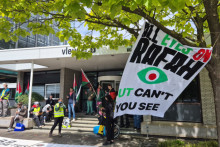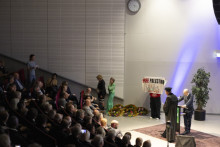What kind of ties does the university actually have with Israel?
There is an agreement for student exchange with the Israeli university Technion in Haifa. Given the negative travel advise, this is mostly a ‘paper collaboration’. Collaboration with Israel is mainly visible in large European research projects. These involve Horizon2020 funding programmes – multi-million euro projects in which both UT and an Israeli university are among the (often dozens of) partners.
Additionally, UT has co-authored several publications with Israeli institutions in recent years. According to research.utwente.nl, there have been 133 joint publications with Israeli researchers over the past five years. For context: that’s out of more than 22,000 publications university-wide during that period.
So overall, the ties are not particularly strong. Yet they do exist.
How strong are these collaborations?
If you go by headlines alone, it’s easy to jump to conclusions. Take this one, for example: ‘Dutch universities involved in dual-use research with Israel’. UT is involved in two such projects.
However, further inquiry by U-Today reveals that UT is not actually collaborating with an Israeli partner in these projects. The professor involved from the Faculty of Science & Technology (name known to the editorial team) explains: ‘The projects focus on EUV technology, the now well-known chip machines from ASML – so the classification as dual-use technology is rather far-fetched. These are consortia led respectively by ASML and Carl Zeiss SMT. We deliver results to those companies, not to an Israeli partner. The Israeli partner doesn’t deliver to us either. They don’t come here, we don’t go there. If we were to withdraw from the consortium for principled reasons, nothing would change for the Israeli partners – the only consequence would be that ASML and Carl Zeiss SMT wouldn’t receive what was agreed upon from UT.’
I read that other universities are cutting ties. Why are they doing that?
That is indeed happening, albeit gradually. The University of Amsterdam ended a student exchange earlier this year with the Israeli Hebrew University. This followed advice from their own committee for ‘sensitive collaborations’, which concluded that the Hebrew University is too closely linked to the Israeli military.
For Utrecht University, enough was enough last May due to Israeli aggression. They cancelled an ongoing research project and a student exchange agreement. Since then, Utrecht has decided not to initiate any new research projects with Israeli institutions. Tilburg University also cut ties last May with two Israeli institutions.
So what is UT waiting for?
No Dutch university has completely severed ties with Israel. It’s not that simple or quick, as has become clear over the past two years. The Executive Board has largely held its ground. Aside from concerns about breach of contract and the desire to ‘remain in dialogue’, Rector Tom Veldkamp pointed out in a May 2024 interview the academic freedom of individual researchers: ‘As rector, I do not decide who our researchers may or may not collaborate with – that is up to them.’
Still, there has been a visible shift, possibly under pressure from the (activist) community. Since last July, UT only initiates new scientific collaborations in conflict zones ‘if the collaboration demonstrably contributes to peace and the protection of human rights’. UT is also establishing its own committee for sensitive collaborations – not just in relation to Israel, but globally. Existing projects, however, will continue as usual.
So when will this committee actually start working?
It’s expected to begin by the end of 2025, although whether that timeline will be met remains uncertain. At present, it’s unclear what the ‘rules of engagement’ and ethical guidelines will be, what role and authority the committee will have, and who should be part of this advisory body. There are also many other organisational considerations, since human rights and ethics are already part of the knowledge security assessment for research projects. National agreements between universities may also be forthcoming. What role UT’s committee will play in the bigger picture? To be continued.
This is all taking far too long…
Anyone who’s been at UT for a while knows that bureaucracy plays a role. At the same time, a university is not immune to pressure from within or outside. For instance, activists from ‘University of Twente for Palestine’ – formerly Enschede Students for Palestine – are once again active on campus. And what about the 250,000 people who joined the Red Line protest in Amsterdam last weekend? More and more experts – from Amnesty to the UN – are calling the situation in Gaza a genocide. Meanwhile, a ceasefire has now been announced.
Shouldn’t universities set an example for society – and cut ties?
That’s a moral question activists would prefer to answer with a firm ‘yes’, sooner rather than later. UT is no exception: universities and their leaders do recognise the gravity of the situation. But that gravity is proving difficult to translate into sweeping, generic decisions. Too many factors are at play – from academic freedom to breach of contract, from symbolic politics to waiting for national political sanctions.
With that in mind, the words of Executive Board President Vinod Subramaniam – spoken back in May 2024 – still resonate: ‘What’s happening in Gaza is a humanitarian disaster. Doing nothing is not an option. But what exactly we should do, I don’t know at this moment.’
In short: the words were found quite early. The actions are only slowly beginning to follow.





